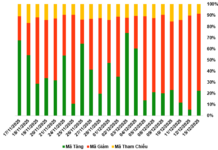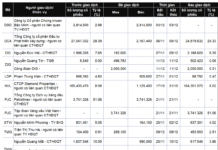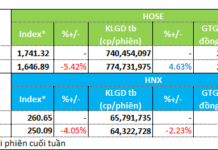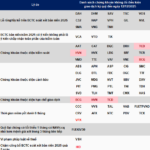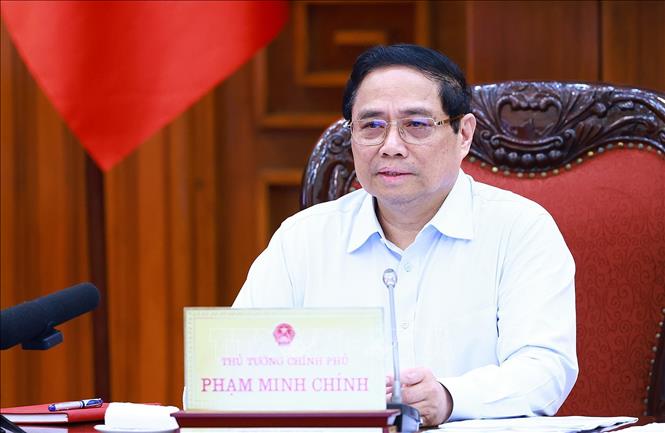
Prime Minister Pham Minh Chinh chaired the meeting. Photo: Duong Giang/TTXVN
Also present were Deputy Prime Ministers Le Minh Khai and Tran Hong Ha; Minister and Head of the Government Office Tran Van Son; Minister of Industry and Trade Nguyen Hong Dien; Minister of Agriculture and Rural Development Le Minh Hoan; Chairman of the State Capital Management Committee Nguyen Hoang Anh; leaders of relevant ministries and sectors; and leaders of corporations in the electricity sector and fuels for electricity production, such as coal and oil and gas.
Ensuring Adequate Electricity in 2024
At the meeting, leaders of ministries, sectors, and units reviewed and discussed management, operation, production, and electricity supply at all stages, including power sources, transmission, distribution, and consumption; and developed response plans and scenarios for possible situations to actively ensure sufficient electricity for production and consumption, with no shortage of electricity, especially due to operational factors.
In the context of unfavorable hydrology in the first three months of the year, to achieve the goal of maximum water saving in hydropower reservoirs, thermal power sources and coal-fired thermal power plants have been mobilized to meet load demand; at the same time, electricity transmission from the South and Central regions to the North has been increased.
Despite higher than expected electricity demand, the national electricity system has met actual electricity consumption needs in the first three months of the year, especially during the Lunar New Year and Tet holidays. In the first quarter of 2024, cumulative electricity output reached 69.34 billion kWh, an increase of 11.77% over the same period of 2023; average daily electricity output reached 762 million kW hours, an increase of 10.4% over the same period of 2023.
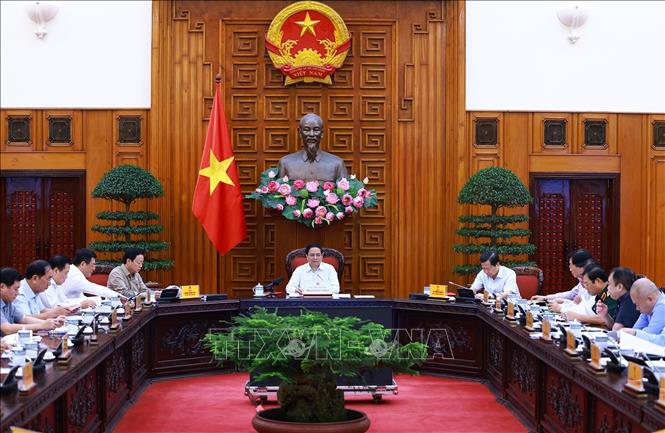
Prime Minister Pham Minh Chinh chaired the meeting. Photo: Duong Giang/TTXVN
To ensure electricity supply throughout 2024, especially during the peak dry season, since November 2023, the Ministry of Industry and Trade has coordinated with the Vietnam Electricity Group (EVN) and relevant ministries, sectors, and units to develop an electricity supply plan for 2024; develop electricity distribution plans; scenarios for balancing electricity output; balancing the capacity of power plants; implement solutions for operating power plants; and promote projects to invest in the construction of electrical works.
The Ministry of Industry and Trade has issued Decisions approving: the Electricity Supply and Operation Plan for 2024; the Coal Supply Schedule for Electricity Generation; the Gas Supply Plan for Electricity Generation; and specifically, the Electricity Supply Plan for the Peak Dry Months from April to July 2024.
In addition, the Ministry has closely monitored the supply of coal and gas for electricity generation; organized working groups to review dry season electricity supply arrangements at electricity generation, transmission, and distribution units; and accelerated the progress of the Quang Trach – Pho Noi 500kV transmission line to review and accelerate the progress to ensure completion by June 2024 as directed by the Prime Minister in time for electricity supply during the peak months.
Units that supply coal and gas for electricity generation have committed to providing sufficient coal and gas for domestic electricity production; hydropower plants are operating reasonably, efficiently, and saving water to serve both irrigation and electricity generation.
Based on the analysis, assessments, as well as the reports and commitments from relevant parties, the Ministry of Industry and Trade affirms that electricity supply for 2024 will be basically ensured.
In the coming years, after the Quang Trach – Pho Noi 500kV transmission line circuit 3 is put into operation with all necessary technical conditions, the power system in the North will be supplemented with increased capacity/electricity from the Central and Southern regions.
However, with the proportion of hydropower sources accounting for more than 32%, the internal supply and demand of the Northern region will often experience imbalances in cases where hydrology is affected by climate change, especially when coal-fired thermal power units experience problems. Therefore, it is extremely important to supplement new electricity sources, especially baseload sources for the North…
Organizing and Managing Electricity Distribution Reasonably by Region and Time
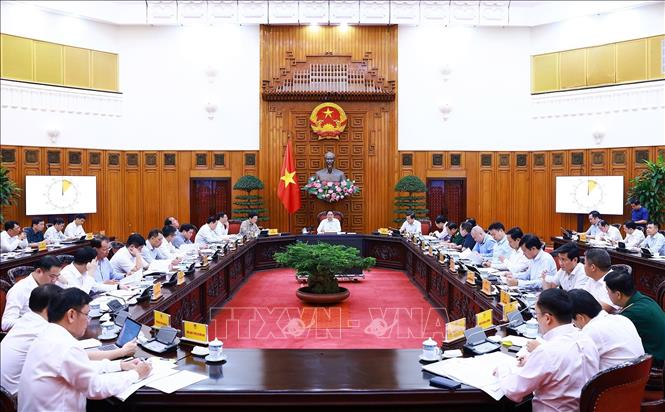
Prime Minister Pham Minh Chinh chaired the meeting. Photo: Duong Giang/TTXVN
Concluding the meeting, Prime Minister Pham Minh Chinh highly appreciated the Ministry of Industry and Trade, the State Capital Management Committee; and relevant corporations, corporations, and enterprises for actively implementing the Government’s and the Prime Minister’s instructions to ensure an electricity supply for production, business, and consumption.
The Prime Minister emphasized that the increasing demand for electricity for production, business, and consumption shows that the economy and society are growing well. This also creates pressure to meet sufficient electricity for production, business, and consumption.
With the goal of not allowing power shortages for production, business, and consumption under any circumstances, the Prime Minister requested that ministries, sectors, agencies, localities, enterprises, and relevant entities, based on their functions, duties, and powers, proactively assess and forecast the situation accurately; develop plans, including the worst-case scenario; develop tasks and solutions that are timely, flexible, reasonable, and effective to meet the set goals.
According to the Prime Minister, electricity has five stages: power source, transmission, distribution, consumption, and price. Of these, the power source must ensure supply to all regions, taking into account the peak electricity consumption months in the North: May, June, and July.
To ensure the power source, the Prime Minister requests the efficient operation, exploitation, and full utilization of the capacity of power plants; review and diversify possible power sources; promote large power source projects; and focus on the worst-case scenario.
In particular, coal-fired thermal power plants must use domestic fuel to the maximum extent possible, which will help ensure the source, increase domestic production, and combat negative practices and foreign exchange hemorrhage; coal enterprises must increase and maximize production capacity; hydropower plants must operate reasonably, efficiently, and save water to serve both irrigation and power generation. Corporations and joint-stock companies that supply fuels for electricity production must prepare adequate gas, oil, and coal to supply electricity production.
On the issue of legal framework, the Prime Minister requested that relevant ministries and sectors draft decrees on the mechanism for direct electricity purchase and sale, self-produced electricity for self-consumption, the mechanism for buying and selling gas electricity, solar power, biomass energy, and waste electricity… to be submitted to the Government for consideration as soon as possible. In particular, submitting the Draft Decree on Direct Electricity Purchase and Sale to the regular Government meeting in April for consideration.
Regarding electricity transmission, Prime Minister Pham Minh Chinh requested that the construction of the Pho Noi – Quang Trach 500kV transmission line circuit 3 be accelerated and completed in June 2024 to transmit electricity from the Central and Southern regions to the North; and the completion of electricity import transmission lines to supplement electricity for production and consumption.
The Head of Government instructed that electricity distribution be managed reasonably by region, by time, and for priority subjects; and simultaneously, that solutions be found to use electricity efficiently and save energy.
As for electricity prices, according to the Prime Minister, they must be competitive but managed by the State; and requested that ministries and sectors coordinate in implementing them according to a suitable roadmap, avoiding jerks. It is important to note savings on inputs and reducing administrative costs in electricity production and business to reduce electricity costs.
The Prime Minister directed specific tasks to each ministry, sector, and locality. In particular, media agencies should promote the communication of policies, provide guidance, and encourage electricity conservation. Localities should effectively implement site clearance work, select investors and contractors to implement electricity projects. In particular, ministries, sectors, and localities must increase their efforts in inspection, supervision, and combating negative practices in the electricity sector.




